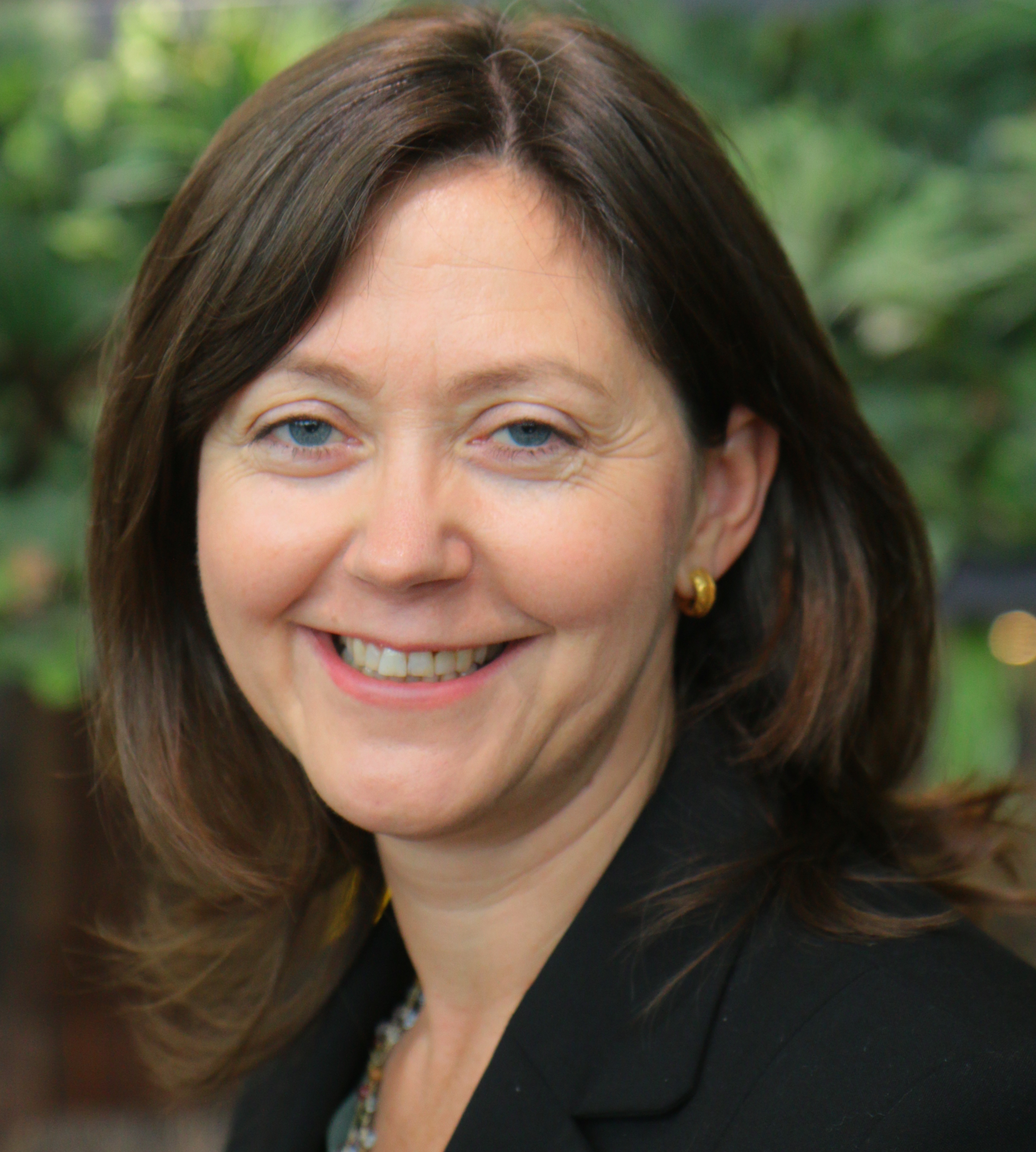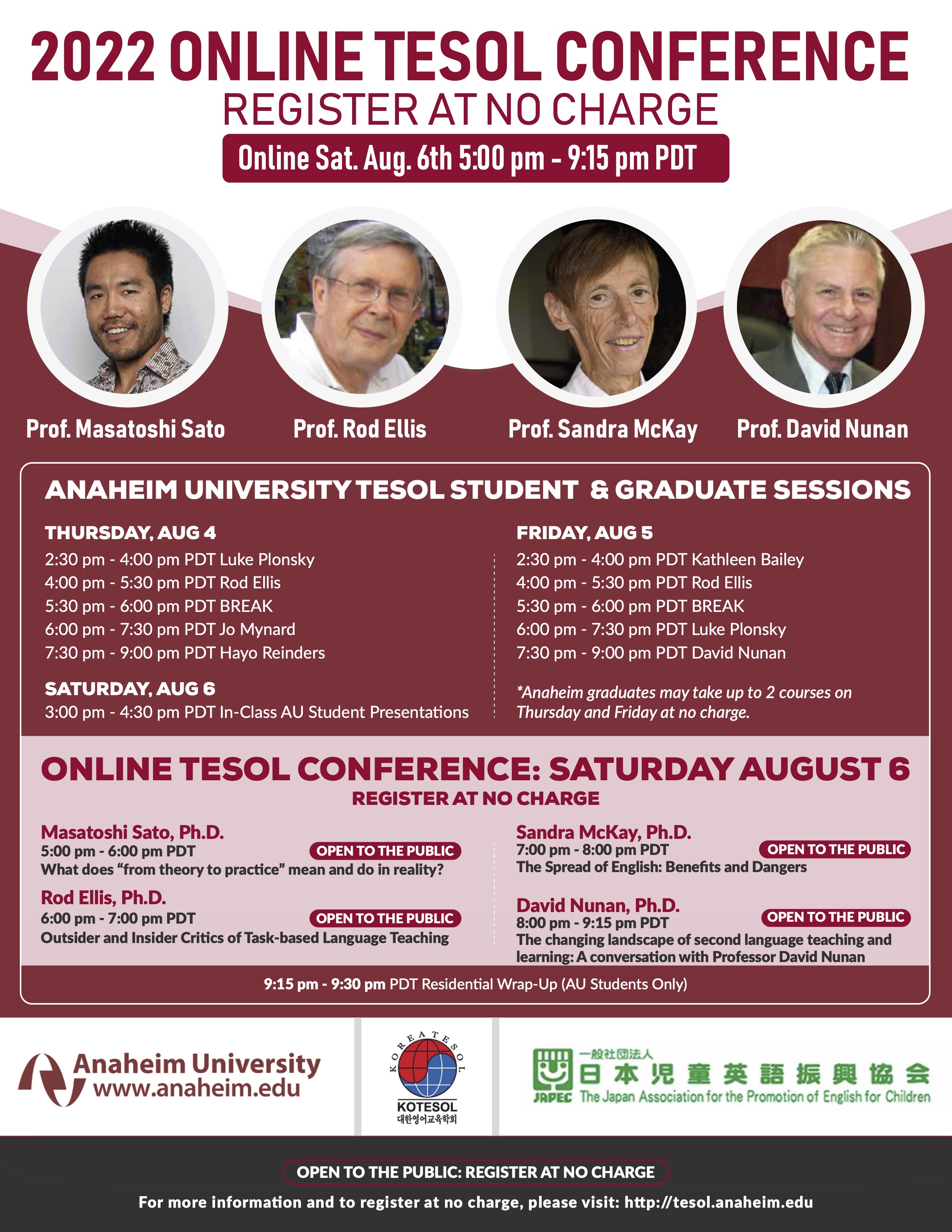
- Anaheim University will hold an online Open TESOL Conference on Sat. Aug. 6th PDT open to the public at no charge.
- The Anaheim University 2022 TESOL Residential Session will be held online from Thursday, August 4th to Saturday, August 6th, 2022 PDT for Anaheim University TESOL students and graduates. AU TESOL graduates may register to attend up to 2 of the non-public sessions at no charge.
The sessions will be led by Anaheim University's acclaimed TESOL faculty and guest speakers, including:
- Dr. Masatoshi Sato, Anaheim University TESOL Professor
- Dr. Rod Ellis, Anaheim University Senior TESOL Professor & Founding Department Chair
- Dr. Sandra McKay, Anaheim University TESOL Professor
- Dr. David Nunan, David Nunan TESOL Institute Director & founding Dean of the Anaheim University Graduate School of Education
The online residential session is part of Anaheim University's online graduate degree programs in TESOL:
- Online Master of Arts in Teaching English to Speakers of Other Languages (MA in TESOL)
- Online Doctor of Education in Teaching English to Speakers of Other Languages (Ed.D. in TESOL)
Tentative 3-Day Schedule (Subject to change)
All times are Pacific Daylight Time (PDT). Click here for a World Time Converter.
* Session Numbers 10, 11, 12 & 13 in red are open to the public at no charge.
Thursday, August 4 |
||||
| Session | Time (Pacific Time) | Speaker/Instructor | Topic | Attendees |
| 1 | 2:30 pm - 4:00 pm PDT | Dr. Luke Plonsky |
What has meta-analysis taught us about SLA? A bird's eye view | Anaheim University MA & Ed.D. Students & Graduates |
| 2 | 4:00 pm - 5:30 pm PDT | Dr. Rod Ellis |
The roles of language proficiency and study abroad in Japanese students’ receptive pragmatic competence | Anaheim University MA & Ed.D. Students & Graduates |
| 5:30 pm - 6:00 pm PDT | Break | Break | Break | |
| 3 | 6:00 pm - 7:30 pm PDT | Dr. Jo Mynard | Supporting language learners' autonomy beyond the classroom: Options for research and practice | Anaheim University MA & Ed.D. Students & Graduates |
| 4 | 7:30 pm - 9:00 pm PDT | Dr. Hayo Reinders |
Using Technology to Motivate Learners | Anaheim University MA & Ed.D. Students & Graduates |
Friday, August 5 |
||||
| Session | Time (Pacific Time) | Speaker/Instructor | Topic | Attendees |
| 5 | 2:30 pm - 4:00 pm PDT | Dr. Kathleen Bailey |
Memories from the Classroom: Outstanding Teachers’ Recollections of Their Own Teachers | Anaheim University MA & Ed.D. Students & Graduates |
| 6 | 4:00 pm - 5:30 pm PDT | Dr. Rod Ellis |
A genre-based approach to investigating the performance of a monologic role-play task | Anaheim University MA & Ed.D. Students & Graduates |
| 5:30 pm - 6:00 pm PDT | Break | Break | Break | |
| 7 | 6:00 pm - 7:30 pm PDT | Dr. Luke Plonsky | Pitfalls and pet peeves in quantitative L2 research: A look behind the curtain | Anaheim University MA & Ed.D. Students & Graduates |
| 8 | 7:30 pm - 9:00 pm PDT | Dr. David Nunan | Q & A with David Nunan | Anaheim University MA & Ed.D. Students & Graduates |
Saturday, August 6 |
||||
| Session | Time (Pacific Time) | Speaker/Instructor | Topic | Attendees |
| 9 | 3:00 pm - 4:30 pm PDT | In-Class AU Student Presentations | Anaheim University MA & Ed.D. Students & Graduates | |
| 3:30 pm - 5:00 pm PDT | Break | Break | Break | |
|
10 * |
5:00 pm - 6:00 pm PDT | Dr. Masatoshi Sato |
What does “from theory to practice” mean and do in reality? | Open to the Public |
|
11 * |
6:00 pm - 7:00 pm PDT | Dr. Rod Ellis |
Outsider and Insider Critics of Task-based Language Teaching | Open to the Public |
|
12 * |
7:00 pm - 8:00 pm PDT |
Dr. Sandra McKay |
The Spread of English: Benefits and Dangers | Open to the Public |
| 13 * | 8:00 pm - 9:15 pm PDT | Dr. David Nunan | The changing landscape of second language teaching and learning: A conversation with Professor David Nunan | Open to the Public |
| 14 | 9:15 pm - 9:30 pm | Residential Wrap-Up | AU Students Only | |
* Session Numbers 10, 11, 12 & 13 in red are open to the public at no charge.
Abstracts
What has meta-analysis taught us about SLA? A bird's eye view
Luke Plonsky, Ph.D.
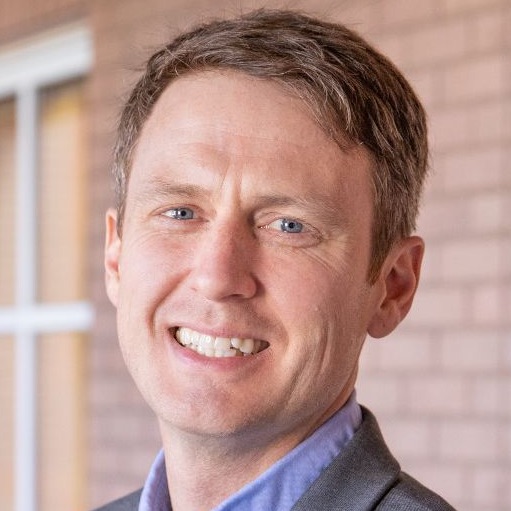
Research synthesis and meta-analysis (RS/MA) comprise a powerful means of aggregating empirical findings and advancing knowledge within a given research domain. RS/MA also provide secondary researchers with a number of benefits that improve upon traditional reviews. Consequently, the field of instructed second language acquisition (ISLA) has turned increasingly to meta-analysis as the preferred means to provide stable syntheses of empirical findings of a given set of questions. This talk takes a bird’s-eye view on the field of ISLA by considering what we can learn about second language (L2) learning and teaching from the large and growing body of meta-analyses in this domain. In particular, we will discuss the effectiveness of L2 instruction as observed in the contexts of L2 grammar, vocabulary, pronunciation, and pragmatics and others. In addition to exploring overall effects in these domains, we will also consider a range of moderators that explain systematic variability in observed effects. Practical implications will also be discussed.
The roles of language proficiency and study abroad in Japanese students’ receptive pragmatic competence
Rod Ellis, Ph.D.
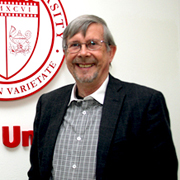
This study investigated the pragmatic competence of 50 Japanese English major students, divided into two groups, one of which participated in a study abroad (SA) program and the other stayed at home (AH) taking normal university classes. Two novel tests were used to measure two aspects of the students’ pragmatic competence. The Irony Test measured their ability to identify negative and positive irony. The Metapragmatic Test measured their ability to identify inappropriate speech acts and their understanding of why they were inappropriate. Results showed that, compared to a group of native speakers, the students had difficulty in identifying both irony—especially positive irony—and speech act inappropriateness. The students’ language proficiency was related to their metapragmatic ability but not to their ability to detect irony. A comparison of the SA and AH students revealed a small advantage for the former in the Metapragmatic Test but not in the Irony Test.
Supporting language learners' autonomy beyond the classroom: Options for research and practice
Jo Mynard, Ph.D.
In this session, we will look at ways that language learners can be supported outside the language classroom in terms of opportunities, resources, and linguistic and personal support (Mynard & Shelton-Strong, 2022a/b). Common practices in our field include the provision of self-access facilities, events and learning communities, peer support systems (Peeters & Mynard, 2021), and skills practice centers. However, in order for these resources and opportunities to be meaningful, learners need to be able to take charge of their overall learning process by planning, monitoring and evaluating their learning and managing their motivation as well as their affective and social processes. Much of this awareness raising can start within the classroom, but learners will also need individualised support outside the classroom (Kato & Mynard, 2016, 2022; Mynard & Kato, 2022). We will look at the role that advising in language learning (ALL) plays in this process i.e., the intentional use of reflective dialogue that helps learners to develop their autonomy. Finally, we will look at ways these outside-class support services can be researched.
Using Technology to Motivate Learners
Hayo Reinders, Ph.D.

What stays the same when everything changes? One of the most profound and perennial challenges language teachers face is how to best engage learners in the language learning experience. Rapidly and regularly changing learning environments, assessment processes and instructional practices can challenge learners in finding and expressing their voice but also offer opportunities for teachers to draw on the affordances of the increased range of educational tools and settings available to them to open up new ways to encourage learner participation. In this practical talk I will draw on three decades of best practice in online, blended and hybrid learning to share recommendations for turning the potential downsides of our changing situations into likely benefits for improving our teaching by encouraging greater learner participation and interaction. Specifically, we will look at ways in which technology can provide more agency to both teachers and learners alike and support language learning beyond the classroom.
Memories from the Classroom: Outstanding Teachers’ Recollections of Their Own Teachers
Kathleen Bailey, Ph.D.
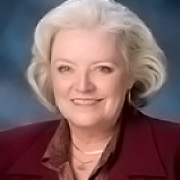
Thinking back on your own life as a student, do you remember a teacher who particularly inspired and encouraged you? Was there someone who had a positive influence on you when you were young, who may have even helped lead you to your career as an educator? And conversely, did you know a teacher who discouraged you – who made you feel, at some point in your schooling, that you were not capable of accomplishing very much? Decades of research have shown (not surprisingly) that teachers are a major factor in students’ learning and motivation. Both quantitative and qualitative studies have documented the ways in which effective teachers support and promote student achievement. This interactive presentation takes a different approach to examining teachers’ influences on learners. It is based on a very simple data collection procedure: I asked teachers two questions. In this talk, I will share memories from several award-winning teachers – specifically their thoughts about their own teachers, both those who inspired them and those who humiliated them.
A genre-based approach to investigating the performance of a monologic role-play task
Rod Ellis, Ph.D.

The talk builds on research investigating role-play tasks (Grabowski, 2009; Ikeda, 2017; Youn, 2008) as an assessment tool. Where previous studies have used conversation analysis to identify salient pragmatic features which were then incorporated into a rating scale, our study uses a genre-based approach (Hassan, 198o; Ventola, 1979) to identify the specific pragmatic features in the performance of a monologic role play. The task required participants to leave a voice-mail message explaining why they were unable to attend a scheduled meeting with their professor. Twenty-four native speakers and 65 L2 learners (L1 Japanese) completed the role play. A comparison of these two groups’ performances revealed a number of differences in key elements of the voice-mail. In addition, there were pragmalinguistic differences (e.g. the native speakers more heavily mitigated their performances). This analysis of the role-play performances led to the development of a scoring system for assessing individual participants’ pragmatic ability which was used to investigate the role of general language proficiency in different aspects of the performance of the genre.
Pitfalls and pet peeves in quantitative L2 research: A look behind the curtain
Luke Plonsky, Ph.D.

For better or for worse, it wasn’t until fairly recently that we as a field began to reflect on and systematically examine our methodological practices (see Gass et al., 2021). This work has led to real progress on fronts ranging from sampling and design to data analysis, researcher training, and open science (e.g., Marsden & Plonsky, 2018; Norouzian, 2020; Sudina, 2021; Veríssimo, 2021). But a wide range of problems persist. In this talk, I discuss several major methodological challenges we face as well as several advances—the “methodological turn”, as Heidi Byrnes (2013) put it—that has been taking place in recent years. In particular, I’ll address the need for stronger validity arguments behind our instruments, and I will encourage a healthy skepticism toward quantitative approaches which (still) dominate in the field. I will also explain why, despite these concerns and reservations, I am generally (if cautiously) optimistic about the future of research methods in the applied language sciences.
Q & A with David Nunan
David Nunan, Ph.D.
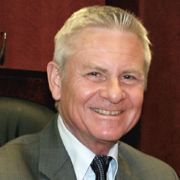
Anaheim University's Master of Arts (MA) and Doctor of Education (Ed.D.) in TESOL students will have an opportunity to ask questions to Dr. David Nunan about their research topic and information related to their thesis, research portfolio or dissertation.
What does “from theory to practice” mean and do in reality?
Mastoshi Sato, Ph.D.
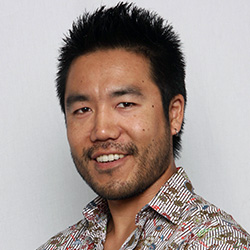
This talk explores ways in which the relationship between second language (L2) theory and practice can be facilitated. L2 researchers have long been concerned about the limited use of research in the classroom yet examinations of the research-practice relationship have been rare. In an effort to narrow the gap, researchers have considered increased ecological validity and different ways of disseminating research. Nevertheless, the problem seems to persist; that is, theory and research seem to have little influence on classroom practices. I will argue that a fundamental cause of the divide between researchers and practitioners may be epistemological rather than logistical, that is, beliefs about each other’s occupations. In this talk, I will first discuss obstacles to a constructive research-practice relationship. I will then explore different ways of narrowing the gap, such as: (a) collaborative mindset; (b) the nature of research; (c) venues for a dialogue; and (d) institutional support. I will conclude the talk by proposing that it is necessary to examine researchers’ attitudes if we wish to facilitate a bi-directional and mutually-beneficial dialogue with practitioners.
Outsider and Insider Critics of Task-based Language Teaching
Rod Ellis, Ph.D.

There are two types of critics – outsider critics who dispute the fundamentals of Task-based Language Teaching (TBLT) and insider critics who advocate for TBLT but differ in a number of fundamental issues. The critiques of the outsider critics include both non-issues and real issues. Examples of non-issues are the claim that TBLT does not help learners acquire ‘new’ language, there is no grammar in TBLT, performing tasks encourages indexical and minimal use of the L2, TBLT is not suited to low-proficiency learners, and TBLT assigns only a very limited role to the teacher. Examples of real issues raised by the outsider critics are the difficulty in defining what a ‘task’ is, the overuse of the L1, and the suitability of TBLT for ‘acquisition-poor’ environments. The insider critics raise a number of issues that are contentious about the design and implementation of TBLT. These include the limitations in the research conducted to date, whether tasks need to be ‘real world’ or just ‘pedagogic’, how to sequence tasks according to differences in their complexity, the role of explicit language instruction, and teachers’ and students’ negative perceptions about TBLT. Looking critically at TBLT from both the insider and outsider perspectives helps to identify problems that need to be addressed - in particular, the kind of additional research needed, the relative places of task-based and task-supported teaching in a language curriculum, and how the constraints that affect the introduction of TBLT in many instructional contexts can be addressed.
The Spread of English: Benefits and Dangers
Sandra McKay, Ph.D.

Today the number of English language learners is rapidly increasing. For some, this is a fact to celebrate since a growing English-speaking global population can facilitate better communication between individuals and nations. For others, this trend signals an unhealthy imbalance in linguistic power which marginalizes those individuals who already have fewer assets and opportunities. The goal of this presentation is to carefully examine both the benefits and dangers of the spread of English.
The changing landscape of second language teaching and learning: A conversation with Professor David Nunan
David Nunan, Ph.D.

Dr. David Nunan will answer questions related to his upcoming paper The Changing Landscape of Second Language Teaching and Learning. Attendees are asked to read the paper in advance.
Open TESOL Seminar Organizing Sponsors
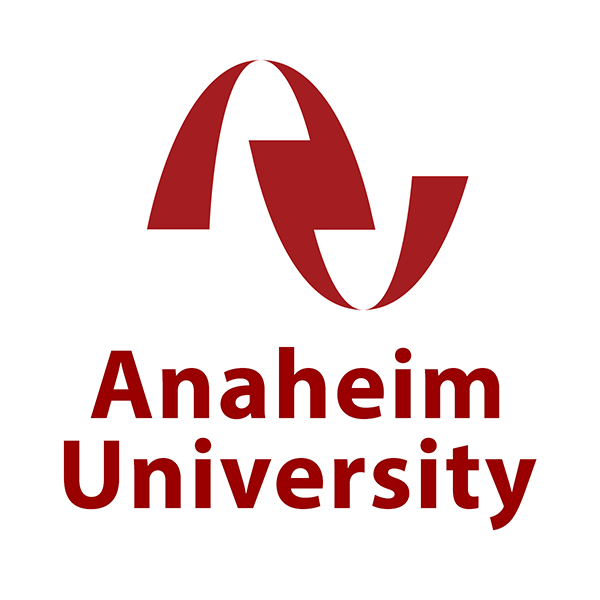 |
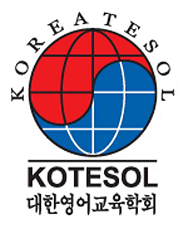 |
 |



